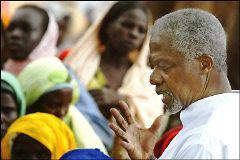Annan hopes AU will pressure Sudan On UN peacekeepers
June 28, 2006 (UNITED NATIONS) — UN Secretary-General Kofi Annan expressed hope that collective pressure at this weekend’s African Union summit will convince Sudanese President Omar al-Bashir to drop his opposition to a U.N. peacekeeping force in conflict-wracked Darfur.
 Annan said he plans to meet the Sudanese leader at the summit in the Gambian capital, Banjul, but he said there are also other African leaders who are anxious to talk to al-Bashir about a U.N. takeover of peacekeeping in the vast western region from the African Union.
Annan said he plans to meet the Sudanese leader at the summit in the Gambian capital, Banjul, but he said there are also other African leaders who are anxious to talk to al-Bashir about a U.N. takeover of peacekeeping in the vast western region from the African Union.
“I hope the collective pressure will make a difference,” the secretary-general told reporters.
Al-Bashir has said the deployment of U.N. peacekeepers will “never take place” while he is president, insisting that U.N. troops want to use Sudan to start “colonizing Africa” again. He blamed “Jewish organizations” for pushing for a U.N. force.
Despite al-Bashir’s rejection of a U.N. force, Annan said he is not giving up, especially since the African Union has said it cannot handle long-term peacekeeping in Darfur and wants its 7,000-strong force replaced by better-equipped and better-funded U.N. peacekeepers.
“In politics, words like `never’ and `forever’ do not exist,” Annan told reporters. “We have seen leaders say lots of things, but they also find reasons and ways to adapt, to shift, to change direction, and often forget that they have used the word `never.”‘
The secretary-general also appealed to members of the U.N. Security Council “to bring their collective and individual pressure to bear … not just on the Sudanese government to cooperate and support the deployment, but also on the rebels outside the agreement to sign the (Darfur Peace) agreement.”
The May 5 agreement was signed by the government and one faction of the Sudan Liberation Army but another faction and the Justice and Equality Movement have refused to sign.
U.S. Ambassador John Bolton said African Union members should pressure al-Bashir to comply with the peace agreement and support a U.N. force. He said the United States would decide on its next steps after the AU summit.
Annan and Bolton spoke to reporters after a closed-door briefing to the council by Undersecretary-General for Peacekeeping Jean-Marie Guehenno, who just returned from a two-week assessment mission to Darfur with the African Union’s peace commissioner Said Djinnit.
Guehenno said the AU mission – which will not be replaced until early 2007 even if the Sudanese government gives approval – must be strengthened immediately because the situation in Darfur remains “very fragile.”
The U.N. and the AU agree that three brigades should be deployed in Darfur “so the situation doesn’t deteriorate,” he said, adding that the Sudanese government has not objected to beefing up the AU force.
A brigade has about 3,500 troops so that would mean adding about 3,500 new troops, bringing the current AU force from 7,000 to about 10,500.
The Darfur conflict began in early 2003 when members of ethnic African tribes rose in revolt against the Arab-led Khartoum government. Sudan’s government is accused of responding by unleashing Arab militias known as the Janjaweed who have been blamed for the worst atrocities. Khartoum denies any involvement, but has committed to disarm the Janjaweed under the peace deal.
More than 180,000 people have died since the conflict began, some 2 million have been rendered homeless, and the fighting has spilled across the border into Chad.
Guehenno said he stressed to the Sudanese government that unless there is a political process – including a dialogue among all the Darfur parties – it will be “very difficult for any force to stabilize the situation.”
Asked about deploying U.N. peacekeepers to Chad, Guehenno said a peacekeeping operation in Sudan would help the situation in Chad because observers could be put along the border so there would be less cross-border action.
Efforts also must be made to start a dialogue between the leaders of Sudan and Chad, who currently have no diplomatic relations, and to end recruitment in camps for Sudanese refugees and displaced Chadians in eastern Chad, he said.
(ST/AP)
